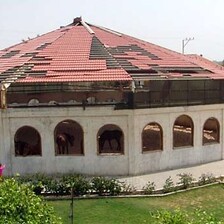Gaza Strip 12 September 2005
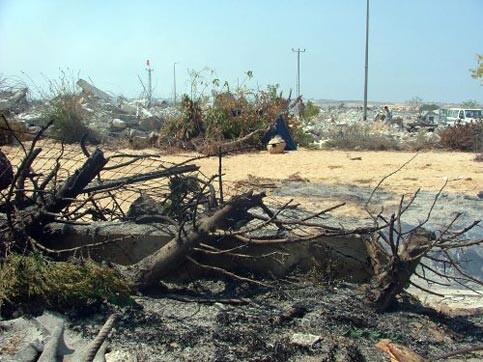
Israeli troops uprooted and set fire to trees before evacuating Duggit. (Photo: Sami Abu Salem/WAFA)
BEIT LAHIA (WAFA) - Despite the hot weather in Gaza, thousands of Palestinian citizens poured Monday into the evacuated colonies at the northern tip of the Gaza Strip.
Elderly, youth, children, fishermen, farmers and family members were keen to have a historical look at the three settlements of Duggit, Eli Sinai and Nissanit.
Fishermen pushed their boats into the sea, while hobbyists installed their fishhooks at the shore. Parents toured among the rubble of Duggit while teenagers were planting Palestinian and other different colored flags on the telegraph poles of the destroyed electric network.
Modern and old vehicles, bicycles, carts, motorcycles, and other means of transportation moved between the heaps of rubble and uprooted trees in the destroyed colonies.
At the southern tip of Duggit, 15-year-old Karam Al-How was playing with the remains of a destroyed car left behind by the occupation. He seemed so happy, enjoying “driving” the car.
Karam said that he is happy not for the evacuation, “I am happy because the prison of Gaza become bigger than before!” he said.
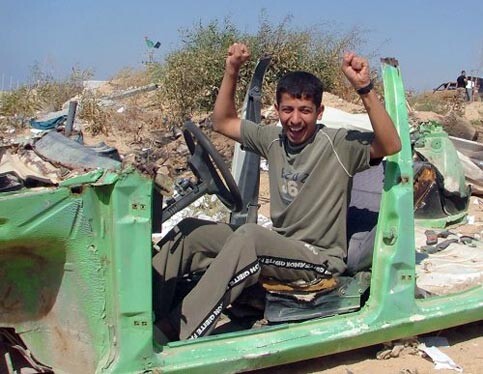
Karam Al-How 15, plays in the evacuated colony of Duggit, happy the Gaza Strip will be a “bigger prison” than before. (Photo: Sami Abu Salem/WAFA)
When asked why he feels that Gaza is a ‘bigger prison’ Karam told me, “Gaza was a small prison and now it is bigger. It is still a prison because the Israelis control the borders, the sea, and we can not travel abroad.”
Karam said that he came to Duggit to see his father’s land. Pointing at an area filled with dry, burned grass he said,: “You see, this is our land, it was full of fruitful trees. There was a well and a house. Now there is nothing, they destroyed everything.”
Karam remembered playing in the land with his sisters and brothers, but in the last five years they were unable to after the Israelis destroyed it and annexed it to the colony.
The boy said that his father, brothers, and he would “make it green again,” joking that he was sad the Israelis destroyed the car before leaving because “my father could use it as compensation for the theft of our land.”
Nearby, wearing a white beard and turban, Said Al-Okka, 77, was sitting on a small hill. Since the early morning he had been drinking Arab coffee from a white pot and staring at a piece of land, filled with dry grass.

Said Al-Okka 77, points at his land in the evacuated colony of Duggit. (Photo: Sami Abu Salem/WAFA)
“This is my own land,” he said. “It was with the Israelis, and now I take it over again after six years of seizure.”
“At least 1,000 olive and fig trees, in addition to a well and house, were flattened by Israeli bulldozers six years ago. You see now I have wasteland only,” he added.
Al-Okka also mentioned that Israelis had stolen several large piles of soft, white sand from his land.
Parents walked by with their two children. Hazem Hawila 42, said that his children asked him to show them the colonies.
“They are so enthusiastic to see the colonies, he told me. “They used to hear about them in the news only. My wife and I are also eager to see them.”
Hawila also wondered why the Israelis uprooted the trees before leaving the colonies.
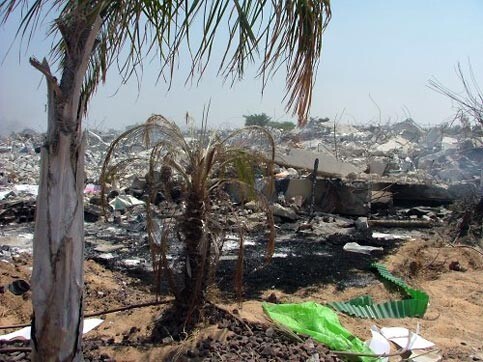
Israeli troops uprooted and set fire to trees before evacuating Duggit. (Photo: Sami Abu Salem/WAFA)
A fisherman, Ayman Al-Hissi, 53, said that he came to ply his trade in an area he was not allowed access to before.
“I used to fish in this area while I was young but, since the Israelis occupied Gaza in 1967, I have never been able to do it,” Al-Hissi said. “Now even if I catch no fish, I am happy for such nostalgia.”
Hawila added that he was relieved not to hear the usual reports that Palestinians were killed by Israeli troops stationed at the watchtowers of the colony.
In the way from Duggit to Nissanit colony, two children, Mohammed Hmaid, 8, and his cousin Abdullah, 7, were riding a bicycle and carrying a Palestinian flag.
Mohammed said he is happy about the Israeli evacuation because there will be no more gunshots heard.
The two children, from Beit Lahia township agreed that they were both looking forward to an absense of gunshots at midnights and being able to go outside their houses at night.
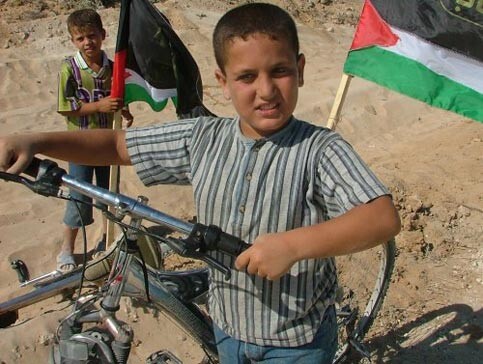
Mohammed Hmaid 8, (right) and his cousin Abdullah (left) happy for the Israeli evacuation as they will hear no more gunshots at the midnight. (Photo: Sami Abu Salem/WAFA)
Sami Abu Salem lives in Jabalia Refugee Camp and works as an English news and features writer at the Palestine News Agency (WAFA). He has also worked at the International Press Center of the Palestinian Authority State Information Service, and works as a freelance writer for local newspapers, focusing on literature and arts.



